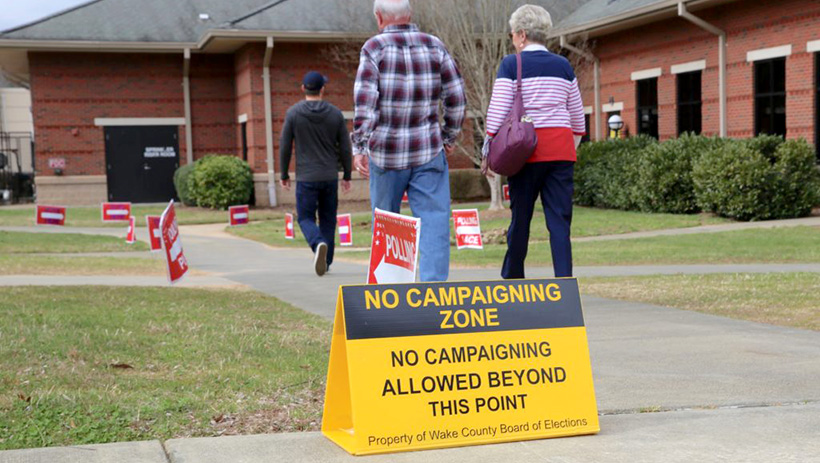The Human Touch Revealing All that is Real
State Board of Elections Recommends Delaying 2021 Elections, 2022 Primary
Publisher's Note: This post appears here courtesy of the Carolina Journal. The author of this post is Andrew Dunn.

With new U.S. Census data not expected until September, the State Board of Elections is recommending moving all of this year's municipal elections to 2022.
Executive Director Karen Brinson Bell also told the elections board Tuesday, Feb. 23, she recommends delaying the 2022 primary elections from March until May.
The changes would need to be passed by the General Assembly. Bell said she would present these recommendations to a House committee on Wednesday, Feb. 24.
Sixty-two municipalities, including North Carolina's largest city of Charlotte, use districts or wards to elect council members. These districts are reapportioned every decade with data provided in the U.S. Census.
This data traditionally is finished by the end of March of the following year, and redistricting is completed by the summer. But the U.S. Census Bureau said results this year would be delayed due to the COVID-19 pandemic. Numbers won't be delivered to the states until Sept. 30.
This poses a problem for the 2021 municipal elections. Filing is currently set to begin in July. Holding elections under previous census data could pose constitutional and other legal issues for those 62 municipalities.
The delayed census results could also create a tight turnaround for the 2022 primary elections, which are scheduled for March. North Carolina could be in line for an additional seat in Congress due to population growth.
Once redistricting is complete, it takes about two months for the State Board of Elections to finish coding and preparing ballots for the new districts.
Thus, Bell recommended moving the primary to May. This election will include several high-profile contests, most notably the party primaries for the U.S. Senate. U.S. Sen. Richard Burr is expected to retire at the end of this term, making it an open seat.
The recommendations were met with little comment by the State Board of Elections members. One member said he was hesitant to endorse the changes.
"It causes me some heartburn to talk about making such a sweeping change," board member Stacy Eggers said. Chairman Damon Circosta said he trusted the General Assembly would make the right decision.
Off-year elections tend to have significantly lower turnout than even-year federal election cycles. Moving municipal elections to 2022 could pose problems for Republicans in urban areas, which have trended Democratic in recent years.
Andrew Dunn is a freelance writer for Carolina Journal.
Go Back

Photo: Don Carrington / Carolina Journal
With new U.S. Census data not expected until September, the State Board of Elections is recommending moving all of this year's municipal elections to 2022.
Executive Director Karen Brinson Bell also told the elections board Tuesday, Feb. 23, she recommends delaying the 2022 primary elections from March until May.
The changes would need to be passed by the General Assembly. Bell said she would present these recommendations to a House committee on Wednesday, Feb. 24.
Sixty-two municipalities, including North Carolina's largest city of Charlotte, use districts or wards to elect council members. These districts are reapportioned every decade with data provided in the U.S. Census.
This data traditionally is finished by the end of March of the following year, and redistricting is completed by the summer. But the U.S. Census Bureau said results this year would be delayed due to the COVID-19 pandemic. Numbers won't be delivered to the states until Sept. 30.
This poses a problem for the 2021 municipal elections. Filing is currently set to begin in July. Holding elections under previous census data could pose constitutional and other legal issues for those 62 municipalities.
The delayed census results could also create a tight turnaround for the 2022 primary elections, which are scheduled for March. North Carolina could be in line for an additional seat in Congress due to population growth.
Once redistricting is complete, it takes about two months for the State Board of Elections to finish coding and preparing ballots for the new districts.
Thus, Bell recommended moving the primary to May. This election will include several high-profile contests, most notably the party primaries for the U.S. Senate. U.S. Sen. Richard Burr is expected to retire at the end of this term, making it an open seat.
The recommendations were met with little comment by the State Board of Elections members. One member said he was hesitant to endorse the changes.
"It causes me some heartburn to talk about making such a sweeping change," board member Stacy Eggers said. Chairman Damon Circosta said he trusted the General Assembly would make the right decision.
Off-year elections tend to have significantly lower turnout than even-year federal election cycles. Moving municipal elections to 2022 could pose problems for Republicans in urban areas, which have trended Democratic in recent years.
Andrew Dunn is a freelance writer for Carolina Journal.
Comment
|
|
Stan Deatherage said:
( February 26th, 2021 @ 11:55 am )
These people need to be watched. They are not honest brokers of what is real.
|
| Constitution, Green Parties Face Uphill Battle to Stay on N.C. Ballot | Carolina Journal, Editorials, Op-Ed & Politics | GOP Lawmakers Blast Cooper for Stalling on School Reopening Bill |
Latest Op-Ed & Politics
|
leftwing ideology can kill
Published: Friday, April 26th, 2024 @ 8:37 pm
By: John Steed
|
|
Governor expected to sign into law
Published: Friday, April 26th, 2024 @ 1:48 pm
By: John Steed
|
|
Atheist Soros, although born Jewish, was Nazi collaborator in Hungary in WWII
Published: Friday, April 26th, 2024 @ 11:58 am
By: John Steed
|
|
anti-immigration conservative nationalist beats Social Democrat incumbent 2 to 1
Published: Friday, April 26th, 2024 @ 9:19 am
By: John Steed
|
|
protecting children and parents from gender ideology promoters
Published: Friday, April 26th, 2024 @ 6:45 am
By: John Steed
|
|
Biden wants to push this in public schools and Gov. deSantis says NO
Published: Thursday, April 25th, 2024 @ 9:19 pm
By: John Steed
|
|
eve 45% of Latinos support mass deportation
Published: Thursday, April 25th, 2024 @ 12:40 pm
By: John Steed
|
|
this at the time that pro-Hamas radicals are rioting around the country
Published: Thursday, April 25th, 2024 @ 8:01 am
By: John Steed
|
|
Pro death roundtable
Published: Wednesday, April 24th, 2024 @ 12:39 pm
By: Countrygirl1411
|
|
populist / nationalist anti-immigration AfD most popular party among young voters, CDU second
Published: Wednesday, April 24th, 2024 @ 11:25 am
By: John Steed
|
|
political scheme behhind raid on Mar-a-Lago
Published: Wednesday, April 24th, 2024 @ 9:16 am
By: John Steed
|
|
how many of these will come to North Carolina?
Published: Tuesday, April 23rd, 2024 @ 1:32 pm
By: John Steed
|
























